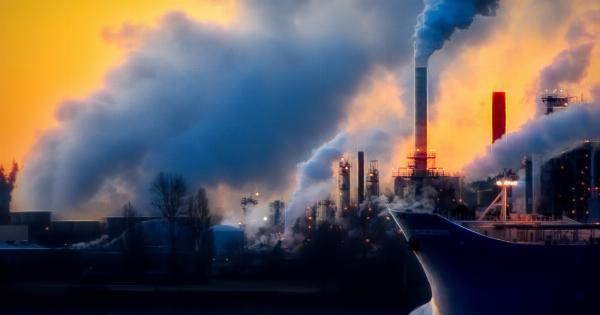It is no secret that corporate greed has infiltrated almost every aspect of our society. From the pharmaceutical industry to the fast food giants, companies are constantly putting profit before people and the environment.
One of the most troubling areas where we can see the devastating effects of this greed is in the health of our lungs.
The Rise of Air Pollution
Air pollution has become a global crisis, with millions of people suffering from its harmful effects. The burning of fossil fuels, industrial emissions, and deforestation have all contributed to the deterioration of the air we breathe.
As corporate giants continue to prioritize their financial gains over environmental regulations, the quality of our air has suffered immensely.
Fossil Fuels and Respiratory Diseases
The combustion of fossil fuels releases harmful pollutants such as nitrogen oxide, sulfur dioxide, and particulate matter into the atmosphere.
These pollutants can penetrate deep into our lungs, leading to respiratory diseases like asthma, bronchitis, and even lung cancer. As corporations continue to exploit and profit from fossil fuel extraction and burning, the health of our lungs is being held hostage.
Industrial Emissions: Silent Killers
Industries are notorious for emitting toxic substances into the air. Chemical plants, factories, and manufacturing units release a cocktail of pollutants, including volatile organic compounds (VOCs), heavy metals, and various gases.
As these toxic substances enter our respiratory system, they weaken our lungs and make them susceptible to infections and diseases.
Deforestation and Oxygen Depletion
Corporate greed also manifests in the destruction of our forests. Deforestation not only leads to the loss of countless plant and animal species, but it also contributes to the depletion of oxygen levels in the atmosphere.
As trees are cut down to make way for agriculture and urbanization, our lungs are robbed of fresh, oxygen-rich air.
The Impact on Vulnerable Populations
While air pollution affects everyone, it disproportionately impacts vulnerable populations. Low-income communities often live near industrial areas, exposing them to higher levels of pollution.
Children and the elderly are more susceptible to respiratory diseases, and the rising air pollution levels only exacerbate their health conditions. As corporate greed continues to defile our air, it is the most marginalized who suffer the greatest consequences.
Regulatory Failures and Corporate Influence
Despite the clear evidence linking corporate activities to air pollution and respiratory diseases, regulatory bodies often fail to take effective action. Corporate lobbyists influence policymakers, bending regulations to favor their interests.
The revolving door between government and industry only worsens the situation, paving the way for corporations to continue their harmful practices without being held accountable.
The Cost of Inaction
The cost of inaction on air pollution and corporate greed is immeasurable. Not only do respiratory diseases place a significant burden on healthcare systems, but they also result in lost productivity, reduced quality of life, and premature deaths.
The consequences of our collective failure to address this crisis are felt by individuals, families, and communities worldwide.
Fighting Back: Grassroots Movements
While the task of combating corporate greed may seem overwhelming, there is hope in the form of grassroots movements.
Communities affected by air pollution are organizing, demanding stricter regulations, and holding corporations accountable for their actions. Through protests, advocacy, and increased awareness, these grassroots movements are working towards creating a cleaner and healthier future for all.
The Role of Sustainable Businesses
Not all businesses prioritize profit over environmental and human well-being. Sustainable and eco-conscious companies are emerging, proving that profitability can coexist with responsible practices.
By investing in renewable energy, implementing sustainable manufacturing processes, and prioritizing employee health, these businesses provide a model for how corporate operations can positively impact the environment and our lungs.
Government Accountability and Policy Changes
Ultimately, it is crucial for governments to hold corporations accountable for their actions.
Stricter regulations, enforcement of environmental standards, and increased penalties for non-compliance are essential to curb corporate greed and protect our lungs. By prioritizing the health of their citizens over corporate interests, governments can play a pivotal role in reversing the current trajectory of air pollution.
Conclusion
The health of our lungs should never be held hostage by corporate greed. The alarming rise in air pollution, driven by the selfish interests of corporations, poses a severe threat to our respiratory well-being.
It is imperative that we take action on an individual, societal, and governmental level to combat this crisis. By demanding stricter regulations, supporting sustainable businesses, and holding corporations accountable, we can free our lungs from the clutches of corporate greed and breathe in clean, fresh air once again.



























